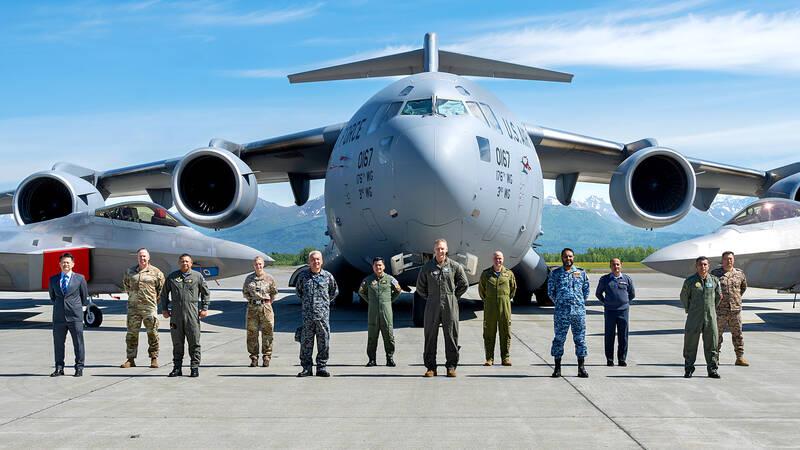US Air Force leaders yesterday voiced concerns about the People’s Liberation Army’s (PLA) missile capabilities and its development of a “kill web,” saying that the US Department of Defense’s budget request for next year prioritizes bolstering defenses in the Indo-Pacific region due to the increasing threat posed by China.
At the same time, US experts said that a full-scale Chinese invasion is risky and unlikely, with Beijing more likely to pursue coercive tactics such as political warfare or blockades to achieve its goals.
Senior air force and US Space Force leaders, including US Secretary of the Air Force Troy Meink and Chief of Space Operations General Chance Saltzman, yesterday attended a US Senate subcommittee hearing to discuss next year’s defense budget.

Photo courtesy of the US Department of Defense
Meink and Saltzman both said that the PLA is advancing its ballistic capabilities.
China has more than 900 short-range missiles capable of hitting Taiwan and 400 land-based missiles that can reach the first island chain, they said.
It also has 1,300 medium-range ballistic missiles that can strike the second island chain, 500 intermediate-range ballistic missiles capable of hitting parts of Alaska and Australia, and more than 400 intercontinental ballistic missiles capable of delivering nuclear weapons globally, they said.
Saltzman said he is most concerned about China’s “kill web,” which enables the PLA to track US joint forces and operations from long distances.
Saltzman in March last year said that China had already launched more than 470 intelligence, surveillance and reconnaissance satellites, “which are feeding information into a powerful sensor-to-shooter kill web.”
This type of “kill web,” which links sensors directly to strike units, accelerates attack speed through data sharing and automation, enabling strikes to be completed within seconds, he said.
Meanwhile, the Stimson Center, a Washington-based think tank, held a seminar titled “The Realities of an Invasion of Taiwan,” with senior fellow Dan Grazier, fellow James Siebens and research associate MacKenna Rawlins analyzing the strategic, political, economic and military factors that China might consider in planning an invasion of Taiwan.
Based on research that included field investigations in Taiwan, Grazier and his colleagues said that launching an amphibious assault on the nation would be fraught with risks, including nuclear escalation, political instability and economic repercussions, with a low probability of success.
The risks China would face in invading Taiwan far outweigh any potential gains, Grazier said.
China has many other military options at its disposal that could be more advantageous and easier to execute, such as a blockade, Siebens said, adding that China is advancing unification through political warfare and coercion.
The US must first help Taiwan respond to the actions Beijing is already undertaking, rather than focusing too heavily on a large-scale invasion, he said.
Should China decide to invade, there would be certain early indicators, including the weakening of Taiwan’s defenses, seizure of its islands and increased coercive measures, he added.
The US and other like-minded nations need to emphasize how important their economic relationships with Taiwan are to their own national interests, Siebens said.
China must understand that any attempt to impose a maritime blockade on Taiwan would not only constitute an act of aggression against Taiwan, but also against all of its partners, he said.

A preclearance service to facilitate entry for people traveling to select airports in Japan would be available from Thursday next week to Feb. 25 at Taiwan Taoyuan International Airport, Taoyuan International Airport Corp (TIAC) said on Tuesday. The service was first made available to Taiwanese travelers throughout the winter vacation of 2024 and during the Lunar New Year holiday. In addition to flights to the Japanese cities of Hakodate, Asahikawa, Akita, Sendai, Niigata, Okayama, Takamatsu, Kumamoto and Kagoshima, the service would be available to travelers to Kobe and Oita. The service can be accessed by passengers of 15 flight routes operated by

Chinese spouse and influencer Guan Guan’s (關關) residency permit has been revoked for repeatedly posting pro-China videos that threaten national security, the National Immigration Agency confirmed today. Guan Guan has said many controversial statements in her videos posted to Douyin (抖音), including “the red flag will soon be painted all over Taiwan” and “Taiwan is an inseparable part of China,” and expressing hope for expedited reunification. The agency last year received multiple reports alleging that Guan Guan had advocated for armed reunification. After verifying the reports, the agency last month issued a notice requiring her to appear and explain her actions. Guan

GIVE AND TAKE: Blood demand continues to rise each year, while fewer young donors are available due to the nation’s falling birthrate, a doctor said Blood donors can redeem points earned from donations to obtain limited edition Formosan black bear travel mugs, the Kaohsiung Blood Center said yesterday, as it announced a goal of stocking 20,000 units of blood prior to the Lunar New Year. The last month of the lunar year is National Blood Donation Month, when local centers seek to stockpile blood for use during the Lunar New Year holiday. The blood demand in southern Taiwan — including Tainan and Kaohsiung, as well as Chiayi, Pingtung, Penghu and Taitung counties — is about 2,000 units per day, the center said. The donation campaign aims to boost

The Central Weather Administration (CWA) said a magnitude 4.9 earthquake that struck off the coast of eastern Taiwan yesterday was an independent event and part of a stress-adjustment process. The earthquake occurred at 4:47pm, with its epicenter at sea about 45.4km south of Yilan County Hall at a depth of 5.9km, the CWA said. The quake's intensity, which gauges the actual effects of a temblor, was highest in several townships in Yilan and neighboring Hualien County, where it measured 4 on Taiwan's seven-tier intensity scale, the CWA said. Lin Po-yu (林柏佑), a division chief at the CWA's Seismological Center, told a news conference